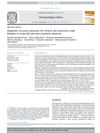scalp tattoos to mimic the appearance of light stubble
Microscopic delivery system that sends growth-promoting signals to hair follicles
supplement to help with hair texture and quality
cosmetic product that temporarily makes hair appear thicker
laser therapy for anti-inflammatory and likely insignificant hair regrowth effects





